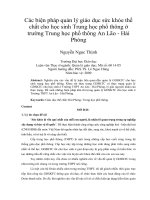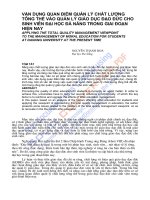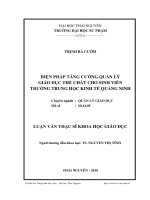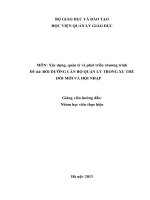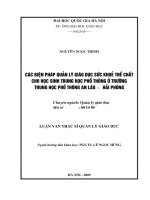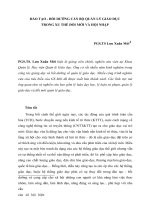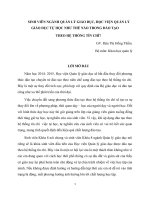Socio-personal, psychological and communicational attributes of the dairy farmers in Jabalpur district of M.P. India - TRƯỜNG CÁN BỘ QUẢN LÝ GIÁO DỤC THÀNH PHỐ HỒ CHÍ MINH
Bạn đang xem bản rút gọn của tài liệu. Xem và tải ngay bản đầy đủ của tài liệu tại đây (226.87 KB, 3 trang )
<span class='text_page_counter'>(1)</span><div class='page_container' data-page=1>
<i><b>Int.J.Curr.Microbiol.App.Sci </b></i><b>(2017)</b><i><b> 6</b></i><b>(11): 1542-1544 </b>
1542
<b>Original Research Article </b>
<b>Socio-Personal, Psychological and Communicational Attributes of the </b>
<b>Dairy Farmers in Jabalpur District of M.P. India </b>
<b>Priti Vishwakarma, Seema Naberia* and N.K. Khare </b>
Department of Extension Education, JNKVV, Jabalpur-482004, (M.P.), India
<i>*Corresponding author </i>
<i><b> </b></i> <i><b> </b></i><b>A B S T R A C T </b>
<i><b> </b></i>
<b>Introduction </b>
Dairy farming is not only an indispensable
component of agriculture, but also the most
suitable production system that has enormous
potential to improve the socio economic
status of the large percentage of the rural
population. The share of livestock product is
estimated at 21% of total Agriculture sector,
India owns the largest livestock population
accounting for nearly 57% of the buffalo
population and 16% cattle population. India
ranks first in milk production accounting for
18.5% of world population, achieving an
annual output of 146.3 million tons during
2015-2016 as compared to 137.69 million
tons during 2014-2015 recording a growth of
6.26% whereas, the Food and Agriculture
Organization (FAO) has reported 3.1 increase
in the world Milk Production from 765
million tons in 2014 to 2015. The per capita
availability of milk in India has Increase from
176 gm/day in 1990 to 322 gm/day by
2015-2016. It is more than the world average 294
gm/day during 2014. This represents
sustained growth in availability of milk and
milk product for growing population
(Anonymous, 2016). Government agencies
and policymakers of India have emphasized
the key role of dairy farming in terms of
improving the socio-economic status of the
rural population by reducing the problems of
unemployment, hence the present work has
been undertaken to know the socio-personal,
<i>International Journal of Current Microbiology and Applied Sciences </i>
<i><b>ISSN: 2319-7706</b></i><b> Volume 6 Number 11 (2017) pp. 1542-1544 </b>
Journal homepage:
The research study was undertaken in Jabalpur district of M.P. to recognize the
socio-personal, psychological and communicational attributes of the dairy farmers.
Total Eight villages of Panagar block were selected randomly by including 120
dairy farmers through pre-tested structural interview schedule to constitute the
samples for the investigation. The study uncovered the facts that majority of the
dairy farmers were middle age group, belonged to other backward class, had
education up to high school level, lived in joint family, possess medium land
holdings, were engaged in dairy + agriculture and falls under medium annual
income group. Majority of dairy farmers were found medium in different
attributes viz. cosmopoliteness, use of information source, mass media use,
innovativeness, decision making ability and achievement motivation. It was also
observed that a large number of them had low risk orientation.
<b>K e y w o r d s </b>
Socio-personal,
Psychological,
Communicational,
Dairy farmers.
<i><b>Accepted: </b></i>
12 September 2017
<i><b>Available Online:</b></i>
10 November 2017
</div>
<span class='text_page_counter'>(2)</span><div class='page_container' data-page=2>
<i><b>Int.J.Curr.Microbiol.App.Sci </b></i><b>(2017)</b><i><b> 6</b></i><b>(11): 1542-1544 </b>
1543
psychological and communicational attributes
of the dairy farmers.
<b>Materials and Methods</b>
Out of the total seven blocks of Jabalpur
district, the present study was conducted
purposively in Panagar block, which is having
maximum population of dairy farmers. Total
eight villages were selected on the basis of
highest dairy farmers from the Panagar block
and 120 dairy farmers were interviewed
through pre-tested structural interview
schedule for the investigation. The collected
data were scored, classified, analyzed and
presented in the form of frequency count and
percentage given in table 1.
<b>Table.1 </b>Distribution of respondents according to their socio-personal, psychological and
communicational attributes
<b>S.No. </b> <b>Attributes </b> <b>Frequency </b> <b>Percentage </b>
Age Young (Up to 35 years) 40 33.33
Middle (36 to 55 years) 55 45.83
Old (Above 55 years) 25 20.84
Caste General 30 25
Other backward classes 40 33.34
Schedule castes 25 20.83
Schedule tribes 25 20.83
Education Illiterate 0 0
Primary education 0 0
Middle education 25 20.84
High school 42 35
Higher secondary 19 15.83
College level 34 28.33
Family type Nuclear family 36 30
Joint family 84 70
Land holding Marginal (Up to 1 ha.) 34 28.33
Small (1.01 to 2 ha.) 35 29.16
Medium (2.01 to 4 ha.) 50 41.66
Large (Above 4 ha.) 1 0.85
Occupation Only Dairy 19 15.84
Dairy + Agriculture 78 65
Dairy + Agricultural along with other occupation 23 19.16
Annual Income Low (Up to Rs 1,00,000) 41 34.16
Medium (Rs 1,00,001 to 2,00,000) 55 45.84
High (Above Rs 2,00,000) 24 20
Cosmopoliteness Low 25 20.83
Medium 55 45.84
High 40 33.33
Use of source of information Low 43 35.83
Medium 58 48.33
High 19 15.84
Mass media use Low 33 27.5
Medium 51 42.5
High 36 30
Risk orientation Low 50 41.66
Medium 38 31.66
High 32 26.68
Innovativeness Low 44 36.66
Medium 55 45.84
High 21 17.5
Achievement motivation Low 42 35
Medium 52 43.34
High 26 21.66
Decision making ability Low 24 20
Medium 56 46.66
</div>
<span class='text_page_counter'>(3)</span><div class='page_container' data-page=3>
<i><b>Int.J.Curr.Microbiol.App.Sci </b></i><b>(2017)</b><i><b> 6</b></i><b>(11): 1542-1544 </b>
1544
<b>Results and Discussion </b>
The study revealed that majority of the
respondents was of middle age group,
belonged to other backward classes and had
high school level of education. This might be
due to lack of educational institutions during
the past time in the villages. Most of the dairy
farmers lived in joint family, possessed
medium size of land holding (2.01 to 4 ha),
and majority of the dairy farmers were having
dairy + agriculture had medium annual
income group. A majority of the respondents
(45.84%) had medium cosmopoliteness, in
case of use of information source maximum
farmers (48.33%) had medium use of
information source and mass media use
(42.50%) this finding is in line with the
findings of Ninama (2012). This may be due
to irregular visits of grass root level workers
and non-conduction of extension activities in
the villages. The highest percentage of
farmers (41.66 %) had low risk orientation
and nearly forty five percent dairy farmers
(45. 84%) had medium innovativeness. The
majority of the farmers (43.34%) had medium
achievement motivation and medium decision
making ability (46.66%). This finding is in
conformity with the finding of Raina <i>et al.,</i>
(2016) and Patel <i>et al.,</i> (2014).
In nut shell it can be concluded as majority of
the of dairy farmers were middle aged,
belonged to other backward class, had
education up to high school level, lived in
joint family, possess medium land holdings,
were engaged in dairy + agriculture and falls
under medium annual income group. Majority
of dairy farmers were found medium in
different attributes viz. cosmopoliteness, use
of information source, mass media use,
innovativeness, decision making ability and
achievement motivation. It was also observed
that a large number of them had low risk
orientation. Socio‐ economic traits of dairy
farmers reveal that there is an extent for
further improvement in socio‐ economic
status, which ultimately lead to development
of animal husbandry.
<b>References </b>
Anonymous. 2016. Economic survey report.
Food and Agriculture Organization.
http: /www.news 18.com.
Kumar A, Sidhu DS and Singh SRK. 2002.
Constraints analysis of dairy farmers in
Bihar. Indian Journal of Animal
Research, 36(2): 102-105.
Ninama BS. 2012. Information management
behaviour in relation to dairy farming
among the farmers. Unpublished M.Sc.
(Ag.) Thesis of CoA Rewa (M.P.).
Patel P, Patel MM, Badodia SK and Sharma
P. 2014 Entrepreneurial Behaviour of
Dairy farmers. Indian Research Journal
Extension Education and and mass
communication channel by the farm
women. Indian Journal of Extension
Education, 40(1&2): 67-70.
Raina V, Bhushan B, Bakshi P and Khajuria
S. 2016. Entrepreneurial Behaviour of
Dairy Farmers Journal of Animal
Research, 6(5): 947-953.
<b>How to cite this article: </b>
Priti Vishwakarma, Seema Naberia and Khare, N.K. 2017. Socio-Personal, Psychological and
Communicational Attributes of the Dairy Farmers in Jabalpur District of M.P. India
</div>
<!--links-->
Xây dựng hệ thống quản lý thu học phí cho Trường bồi dưỡng cán bộ quản lý văn hoá thể thao và du lịch
- 55
- 1
- 5
